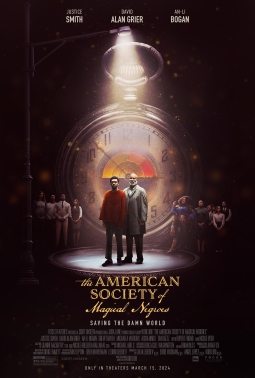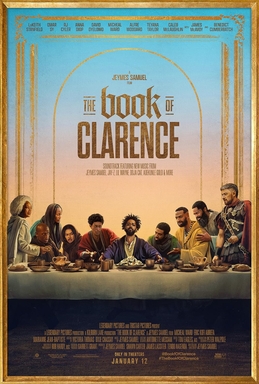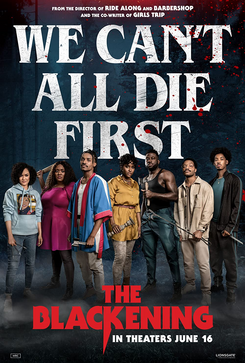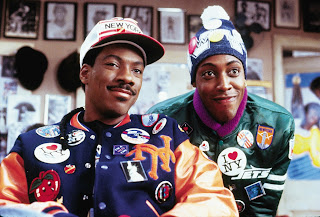Gather around, brothers and sisters, to hear about those who pursued the Devil to find that the Devil pursued them back. Every year without fail, I find that there is one movie that is wildly and irrationally overrated. This year, it looks like Sinners is a strong contender for that title. Overly long, sometimes unintentionally hilarious, Sinners thinks it is saying a lot when it actually says nothing.
Twin brothers Elijah "Smoke" and Elias or "Stack" Moore (Michael B. Jordan in dual roles) have returned to Mississippi after stealing money from Chicago mobsters.
At this point, I want to stop to say that "Smoke/Stack" is the first thing that I found hilarious. I figure that writer/director Ryan Coogler meant it to have them called "Smoke" and "Stack". However, I cannot take characters whose nicknames are "Smoke" and "Stack" seriously, let alone see them as menacing. It's as idiotic as having the twins nicknamed "Wrist" and "Watch". Yet, I digress.
Smokestack want to start a juke joint. They get their cousin Sammie (Miles Caton) to join their venture, as Sammie is a skilled blues guitarist. He is also a PK or preacher's kid. Sammie's father Jedidiah (Saul Williams) disapproves of this devil's music and wants his son to follow in his steps to be a preacher. However, the call of the blues and of beautiful women like the married Pearline (Jayme Lawson) is too strong to get Sammie on the path of righteousness.
Smokestack get blues legend Delta Slim (Delroy Lindo) to drop his weekly booking at another juke joint to be the headliner for their new establishment, Club Juke. They also get their friends the Chows to supply both the booze and the signage for Club Juke. Smokestack finds Cornbread (Omar Miller), a large man working the sharecropping cotton fields, to be the bouncer. One person who probably wouldn't get bounced out is Smoke's estranged wife, Annie (Wunmi Mosako), the Voodoo Queen of the Delta. Smoke/Elijah and Annie lost a child despite her powers. She is, however, an excellent cook. One person who would get bounced out is Mary (Hailee Steinfeld), Stack/Elias' former lover who is, if my calculations are correct, 1/8th black (she says that her mother's daddy was half-black, making her mother's makeup as quarter-black). Mary has been passing as white, so any association will be dangerous for both Mary and Stack.
There is a more dangerous force out there. For once, it is not the Klan. It is Remmick (Jack O'Connell). He is an Irish vampire who has managed to escape the nearby Choctaw community and found delicious refuge with KKK members Joan and Bert (Lola Kirke and Peter Draimanis). At the juke joint's opening, Sammie (whose stage name is Preacherboy) plays some mean blues that has summoned the music of the past and future. Everything from traditional African dancers to hip-hop DJ's float onto Club Juke. However, that also summons Remmick and his growing vampire clan. Not to be left out, Remmick, Joan and Bert try a little bluegrass before being rejected entry.
However, you can't keep white vampires out permanently. They turn Mary into one, who in turn turns Stack into one. Annie, in tune with the spirits, realizes the danger that they are in. Now, the remaining survivors find themselves besieged at Club Juke by a multicultural vampire horde. Who will live to see the sun rise? Who will continue to play the blues long after October 16, 1932? Will Preacherboy Sammie become a musical legend, or will he turn towards the light?
I rarely criticize fellow film reviewers publicly. I still will not mention specific names here. I will say, however, that a certain reviewer that I see on the YouTube stated that Jack O'Connell was "terrifying" as Remmick. I literally burst out laughing at this statement and though, to quote Sophia Petrillo, "You're nuts". I did a lot of laughing while watching Sinners, but I figure that Coogler did not mean for me to do so. I do wonder though, what kind of reaction he thought I should have had when I see a group of vampires break out into Will You Go, Lassie? outside the juke joint? I do not know if a trio singing a folk song is "terrifying", but I was more puzzled as to what exactly this was doing in this very long film. Less terrifying is seeing O'Connell break out into an Irish jig while singing All the Way to Dublin, with a group of new vampires dancing along.
I was howling with laughter at this. To be fair, I may be among the few Mexican Americans who loves Celtic music, so I did enjoy the soundtrack.
It is not as if I do not get what Coogler was aiming for. There is the scene when through Annie's voiceover, we get to the I Lied to You dance section. Here, Coogler makes an overt call-out tying in Preacherboy's blues to both traditional African music right down to twerking dancers and gangster rap. I get that Coogler was stating how all this music ties itself together, past, present, future. The sequence, however, felt self-indulgent, almost comical. I suppose it would have been too much to ask that singers in the Mahalia Jackson, Marion Anderson and Ella Fitzgerald manner pop up in this elaborate fantasy number.
What would any of those women know about the African American musical experience?
I know many people simply loved that sequence and think that it is a highlight of Sinners. That is their right. I watched thoroughly bored, thinking that Honeydripper covered a similar subject better. Granted, there were no vampires in Honeydripper. Sinners was meant to be horror. Again, I get that. Also again, I was laughing when I was not counting down the time in a film that at over two hours is simply too long. Honeydripper, sans vampires, is almost fifteen minutes shorter. Granted, it might be longer than it needed to be too. However, it is well over half an hour before we even get to the juke joint opening, and I felt as if the film was just spinning its wheels. At an hour and fifteen minutes, I was bored and felt as if it ran out of story.I think Sinners lost me early on, when we get the Smokestack Twins. Try as I might, I cannot take characters named "Smoke" and "Stack" seriously. That others never commented on how they were Smokestack, let alone did it without breaking out in giggles, I cannot explain.
I also cannot explain the performances. I felt that almost all the acting was a bit too stylized and unnatural. Michael B. Jordan in his dual role felt far too forced in the Smokestack swagger. I never believed that Smoke or Stack were real people. They were more caricatures of men working to look tough and menacing.
That sense of exaggeration extended to almost everyone in Sinners. Hailee Steinfeld felt very overly dramatic as Mary, the woman who longs for Stack but whose fair complexion gives her a little white privilege. She was a bit overwrought before she became a vampire. Once she got the bite, she just became comical. Jack O'Connell was nowhere near "terrifying". He was hilarious and not in a good way. Except for Delroy Lindo (underused) and Mosaku as Annie the Voodoo Queen, I think the acting was pretty lousy.
As a side note, if Annie got the bite too, how does she narrate after she makes her sacrifice? Moreover, we see Annie and Smoke reunite postmortem with their child. I did not care, and I won't delve into any theological matters involving how the Voodoo Queen can achieve an almost heavenly resolution.
I will say that I did like the music.
Sinners got its mojo working, but it don't work on me.



















.png)


.jpg)












